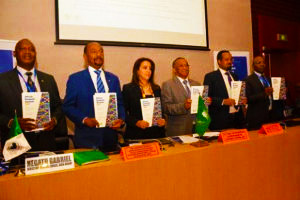African Economy to Advance, Gain Momentum despite Variation (February 08, 2019)
African economy will continue to advance and gain momentum despite regional variation, African Economic Outlook 2019 revealed
African economy to advance, gain momentum despite variation
Addis Ababa, February 8, 2019 – African economy will continue to advance and gain momentum despite regional variation, African Economic Outlook 2019 revealed.
According to the report, Africa’s real Gross Domestic Product (GDP) growth is projected to accelerate to 4 in 2019 and 4.1 percent 2020 from 3.5 percent in
2018.
East African countries growth will project to 5.9 percent in 2019 and 6.1 percent in 2020 from 5.7 percent in 2018. Balanced macroeconomic stability and recovery in some commodity prices are among the economic progress drivers.
During launching the Economic Outlook, Finance Minister Ahmed Shide said “I am encouraged by the positive and strong economic outlook for the continent despite escalating global trade tension, debt vulnerabilities, and uncertainty in global commodity market prices.”
He added that it is important to undertake deep economic reforms and focusing on development financing consistent with prudent fiscal and monetary policies that preserve sustainable debt outlook.
Noting that job creation is lagging very much behind the rate of labor force growth on the continent, Ahmed pointed out “this stance, if not addressed adequately and on a time basis, will not only continue to depress the average income of our citizens but will also exclude our youth from economic activities.”
The Minister stressed that “inability to create sufficient job opportunities for the youth will also have detrimental effect on the future of the continent.”
Ethiopia has signed the African Congenital Free Trade Area (AfCFTA) and eased visa requirements to foster closer cooperation and regional integration.
AU Economic Affairs Commissioner, Professor Victor Harison, said “our common challenge is to support the trend to quickly return to a second decade of growth.”
The time for economic transformation and diversification is coming to Africa, he said, adding that “it will enable to generate value added, create productive jobs and support the implementation of the Continental Free Trade.”
Commissioner Harison assured “to meet the challenges in Africa, the African Union is striving to multiply initiatives on a continental scale.”
The report indicated that AfCTA in its initial phase will bring about 2.8 billion in real incomes and increase intra Africa trade by 15 percent, according to ENA.
It also recommends countries to eliminate applied bilateral tariffs and keep rules of origin simple flexible and transparent, remove all non-tariff barriers on goods and services on a most favored nation basis.




Leave a Reply
Want to join the discussion?Feel free to contribute!